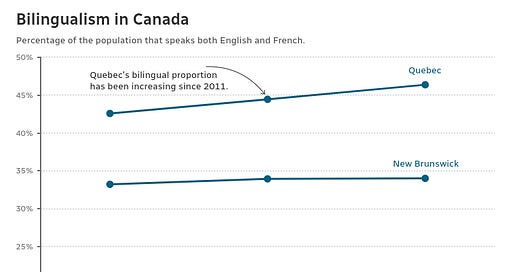En français s'il vous plais
One of the real joys of living in France has been the opportunity to begin speaking the French language. I can stumble through reading most common things, and with help from Deep L can write needed emails and requests, and in fact I can hear and understand common discussions reasonably well.
I can shop at the boulangerie or boucherie, buy stamps at La Poste, and if I have some time to prepare, can tour a house with a real estate agent. In other words, I won’t claim fluency, but I can stumble by in a day to day setting.
What I’ve found though is that the more comfortable I am with the French language, the more I understand that Canada’s official bilingualism is largely fiction.
The concepts of protection for French and English go all the way back to the Constitution Act of 1867.
Use of English and French Languages
133 Either the English or the French Language may be used by any Person in the Debates of the Houses of the Parliament of Canada and of the Houses of the Legislature of Quebec; and both those Languages shall be used in the respective Records and Journals of those Houses; and either of those Languages may be used by any Person or in any Pleading or Process in or issuing from any Court of Canada established under this Act, and in or from all or any of the Courts of Quebec. The Acts of the Parliament of Canada and of the Legislature of Quebec shall be printed and published in both those Languages.
Growing up in British Columbia it was taken for granted that our Federal government is fluently bilingual, and that it happily serves Canadians in either official tongue. More broadly though it was just assumed that yes, in Canada we happily live in a two language nation, all singing Frère Jacques. Really, I learned that song in school, so it must be true.
Living in France I’ve realised that this is nonsense. Learning to badly sing a couple of french language folk songs does not make us bilingual, or even conscious that it matters to sing “Sonnez les matines” and not “sonnay lomantina.” And it strikes me that in all likelihood the teachers who taught us these songs also didn’t speak or understand French.
All of this is prompted by discussions happening over on Twitter about new Stats Canada numbers looking at language. According to CBC, “A quarter of Canadians now have a first language that is neither English nor French, according to newly released census data on language, which marks a record high.” The biggest news was the number of Asian and south-Asian languages that now account for the “mother tongue” of many Canadians, but there was also data about French in Canada.
This graph, borrowed from CBC sums things up. Although the bilingual population in Quebec is up a bit, in the rest of Canada it’s well below 20%.
And in BC it barely manages 6.6%, just above Alberta, and down from 6.8% in 2011.
This is all very interesting, and overall suggests that outside of Quebec, and especially outside of Montreal, Canada has never really been bilingual, and is likely moving slowly in the direction of non-Francophone.
I think though that the moment when the essentially Anglophone nature of Canada was driven home this month was when I was on the telephone to to Revenue Canada, trying to change my mailing address. After an hour and a half on “hold” I talked with a very nice woman, and then gave her my new address.
She was pretty much stopped dead by the extreme exotica of:
9 Rue du Val Noble
2éme etage
61000 Alençon
FRANCE
And when I say “dead” I mean that I had to SPELL the word “Rue.” Needless to say, at Revenue Canada, “Alençon” lacks a cedilla under the c.





